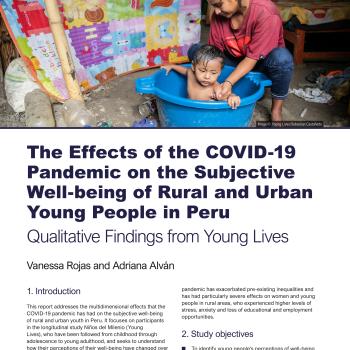
This report is a summary of a longer report published in Spanish and available on the Niños del Milenio website here. Niños del Milenio/Young Lives has followed children through to young adulthood in Peru, including understanding how their perceptions of their well-being have changed over time. Using qualitative data from 2 birth cohorts, aged 21- 22 years and aged 28 - 29 years, collected in 2023, the report considers these changing perceptions, and in particular how young people's well-being was affected by the Covid-19 pandemic.
The authors find that young Peruvians' subjective well-being shifts as they move through different stage's of life, for example as they move into adulthood, or form their own families. Social, economic and emotional factors impact both cohorts' subjective well-being, and these impacts were exacerbated during the pandemic with the two cohorts being affected differently. The Younger Cohort, moving from education to work during the pandemic, faced both interruptions to their education and greater difficulties securing a job which created uncertainty about their future. The Older Cohort, more established in work, suffered greater financial and social pressures to provide for their families during the associated economic crisis, leading to them reporting lower levels of well-being. The pandemic seriously affected the mental health of young people, with isolation, stress and uncertainty about their future leading to higher levels of anxiety and depression. Young women, who often took on additional domestic responsibilities during the lock down, and young people in rural areas were most affected.
Whilst the research found that young people's subjective well-being was impacted by the pandemic, the authors also point to their resilience, with family support networks, staying connected using technology and adapting to new forms of work, such as entrepreneurship enabling many to find new forms of well-being in difficult circumstances. The authors put forward public policy recommendations to strengthen the support for young people, especially those in vulnerable situations.

This report is a summary of a longer report published in Spanish and available on the Niños del Milenio website here. Niños del Milenio/Young Lives has followed children through to young adulthood in Peru, including understanding how their perceptions of their well-being have changed over time. Using qualitative data from 2 birth cohorts, aged 21- 22 years and aged 28 - 29 years, collected in 2023, the report considers these changing perceptions, and in particular how young people's well-being was affected by the Covid-19 pandemic.
The authors find that young Peruvians' subjective well-being shifts as they move through different stage's of life, for example as they move into adulthood, or form their own families. Social, economic and emotional factors impact both cohorts' subjective well-being, and these impacts were exacerbated during the pandemic with the two cohorts being affected differently. The Younger Cohort, moving from education to work during the pandemic, faced both interruptions to their education and greater difficulties securing a job which created uncertainty about their future. The Older Cohort, more established in work, suffered greater financial and social pressures to provide for their families during the associated economic crisis, leading to them reporting lower levels of well-being. The pandemic seriously affected the mental health of young people, with isolation, stress and uncertainty about their future leading to higher levels of anxiety and depression. Young women, who often took on additional domestic responsibilities during the lock down, and young people in rural areas were most affected.
Whilst the research found that young people's subjective well-being was impacted by the pandemic, the authors also point to their resilience, with family support networks, staying connected using technology and adapting to new forms of work, such as entrepreneurship enabling many to find new forms of well-being in difficult circumstances. The authors put forward public policy recommendations to strengthen the support for young people, especially those in vulnerable situations.

